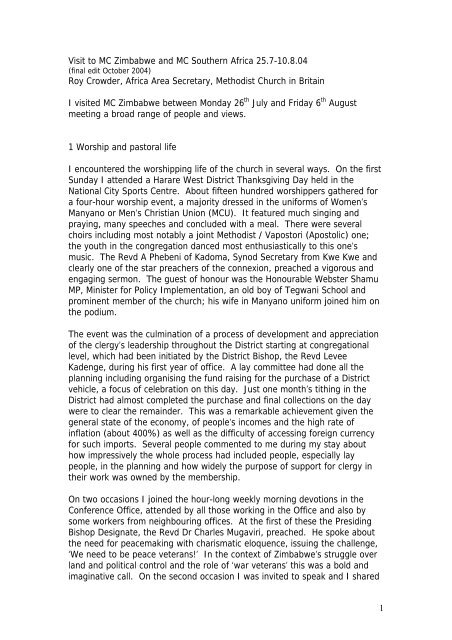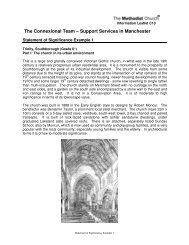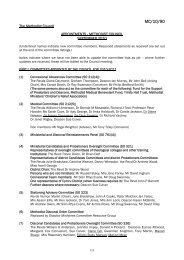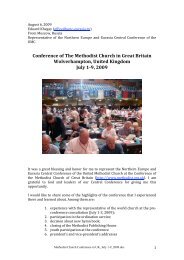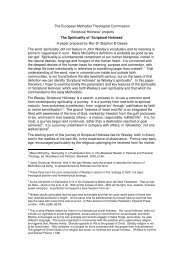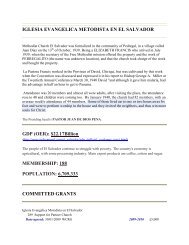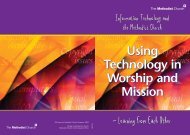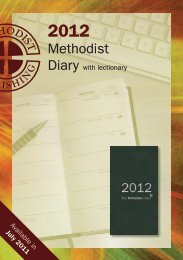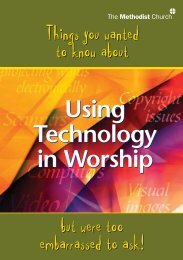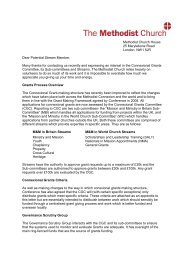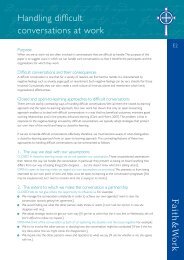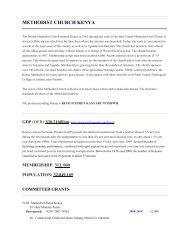Visit to Zimbabwe & Methodist Church of Southern Africa
Visit to Zimbabwe & Methodist Church of Southern Africa
Visit to Zimbabwe & Methodist Church of Southern Africa
Create successful ePaper yourself
Turn your PDF publications into a flip-book with our unique Google optimized e-Paper software.
<strong>Visit</strong> <strong>to</strong> MC <strong>Zimbabwe</strong> and MC <strong>Southern</strong> <strong>Africa</strong> 25.7-10.8.04(final edit Oc<strong>to</strong>ber 2004)Roy Crowder, <strong>Africa</strong> Area Secretary, <strong>Methodist</strong> <strong>Church</strong> in BritainI visited MC <strong>Zimbabwe</strong> between Monday 26 th July and Friday 6 th Augustmeeting a broad range <strong>of</strong> people and views.1 Worship and pas<strong>to</strong>ral lifeI encountered the worshipping life <strong>of</strong> the church in several ways. On the firstSunday I attended a Harare West District Thanksgiving Day held in theNational City Sports Centre. About fifteen hundred worshippers gathered fora four-hour worship event, a majority dressed in the uniforms <strong>of</strong> Women’sManyano or Men’s Christian Union (MCU). It featured much singing andpraying, many speeches and concluded with a meal. There were severalchoirs including most notably a joint <strong>Methodist</strong> / Vapos<strong>to</strong>ri (Apos<strong>to</strong>lic) one;the youth in the congregation danced most enthusiastically <strong>to</strong> this one’smusic. The Revd A Phebeni <strong>of</strong> Kadoma, Synod Secretary from Kwe Kwe andclearly one <strong>of</strong> the star preachers <strong>of</strong> the connexion, preached a vigorous andengaging sermon. The guest <strong>of</strong> honour was the Honourable Webster ShamuMP, Minister for Policy Implementation, an old boy <strong>of</strong> Tegwani School andprominent member <strong>of</strong> the church; his wife in Manyano uniform joined him onthe podium.The event was the culmination <strong>of</strong> a process <strong>of</strong> development and appreciation<strong>of</strong> the clergy’s leadership throughout the District starting at congregationallevel, which had been initiated by the District Bishop, the Revd LeveeKadenge, during his first year <strong>of</strong> <strong>of</strong>fice. A lay committee had done all theplanning including organising the fund raising for the purchase <strong>of</strong> a Districtvehicle, a focus <strong>of</strong> celebration on this day. Just one month’s tithing in theDistrict had almost completed the purchase and final collections on the daywere <strong>to</strong> clear the remainder. This was a remarkable achievement given thegeneral state <strong>of</strong> the economy, <strong>of</strong> people’s incomes and the high rate <strong>of</strong>inflation (about 400%) as well as the difficulty <strong>of</strong> accessing foreign currencyfor such imports. Several people commented <strong>to</strong> me during my stay abouthow impressively the whole process had included people, especially laypeople, in the planning and how widely the purpose <strong>of</strong> support for clergy intheir work was owned by the membership.On two occasions I joined the hour-long weekly morning devotions in theConference Office, attended by all those working in the Office and also bysome workers from neighbouring <strong>of</strong>fices. At the first <strong>of</strong> these the PresidingBishop Designate, the Revd Dr Charles Mugaviri, preached. He spoke aboutthe need for peacemaking with charismatic eloquence, issuing the challenge,‘We need <strong>to</strong> be peace veterans!’ In the context <strong>of</strong> <strong>Zimbabwe</strong>’s struggle overland and political control and the role <strong>of</strong> ‘war veterans’ this was a bold andimaginative call. On the second occasion I was invited <strong>to</strong> speak and I shared1
with this leadership corps some <strong>of</strong> the work <strong>of</strong> MC Kenya with disability issuesand MC <strong>Southern</strong> <strong>Africa</strong> with children’s ministries. People appreciatedinformation on the experiences <strong>of</strong> neighbouring churches which <strong>of</strong>ferstimulating challenges <strong>to</strong> those engaged in similar work in <strong>Zimbabwe</strong>. Thisreaction underlined for me yet again the importance <strong>of</strong> stimulating contactand exchange <strong>of</strong> experience between our <strong>Africa</strong>n partner churches. It seemsespecially necessary at the level <strong>of</strong> programme direc<strong>to</strong>rs who have little timeor budget for regional travel but who are tackling very similar issues in theirrespective countries.While enjoying the extraordinary hospitality <strong>of</strong> the Presiding Bishop’s house Inoted his punishing timetable <strong>of</strong> pas<strong>to</strong>ral activity as well as administration. Iwas privileged <strong>to</strong> join in some <strong>of</strong> these meetings. I attended an eveningfellowship meeting <strong>of</strong> the Souther<strong>to</strong>n Society in the Highfields Circuit. Thisproved <strong>to</strong> be a small but vigorous congregation worshipping in a woodenstructure, closed in on three sides, in the small yard <strong>of</strong> a layperson’s house inan industrial suburb <strong>of</strong> Harare. This is the congregation in which thePresiding Bishop and his wife have membership, an encouraging support <strong>to</strong> asmall but growing society seeking <strong>to</strong> build their own building. We held afellowship meeting <strong>of</strong> prayer, singing and biblical reflection. Forty <strong>to</strong> fiftyadults and children were present.On another occasion a dozen members <strong>of</strong> one <strong>of</strong> the Greencr<strong>of</strong>tcongregation’s class meetings came <strong>to</strong> the Bishop’s house for a devotionalfellowship. The congregation is building a large church on the plotimmediately next door <strong>to</strong> the Bishop’s residence and we inspected progresson the foundations. The next evening we joined a family from this classmeeting in an evening meal followed by prayers. The spontaneity andenthusiasm <strong>of</strong> devotion in these family sessions is very notable.When in Bulawayo I attended an early morning prayer meeting. This was aweekly ecumenical gathering in the chapel <strong>of</strong> a suburban Anglican <strong>Church</strong>. Adozen or so white pr<strong>of</strong>essional men and women and a black anaesthetistshared a liturgy <strong>of</strong> prayer and biblical reflection. Several <strong>of</strong> them were facingdirect pressures from the political, economic and legal situation in thecountry. These included Government pressure over the setting <strong>of</strong> fees in theindependent schools and court action over foreign exchange dealings due <strong>to</strong>draconian Government action <strong>to</strong> control forex flows. They prayed for thestate <strong>of</strong> the nation and for the particular situations <strong>of</strong> individuals.These were encounters with a way <strong>of</strong> life filled every day, indeed every hour,with public prayer and devotion. It is true <strong>of</strong> all the <strong>Africa</strong>n partner churcheswhich I visit and was particularly true <strong>of</strong> my visit <strong>to</strong> <strong>Zimbabwe</strong> this time. Itcontrasts strongly with the more private, marginal and minority-based,though no less devoted, experience <strong>of</strong> religious life in Britain.2
2 <strong>Church</strong> life and organisationAs the Harare West District event demonstrated the church in <strong>Zimbabwe</strong> isvigorous; it is also clearly growing. Congregational life is strong. A youngpre-collegiate minister serving in a Harare circuit <strong>to</strong>ld me that his suburbanchurch has three Sunday morning services with 200 attending the 6.30amservice, 400 at 9.00am (which is an entirely children’s service) and 800 at11.00am. There is a class meeting on a Tuesday evening attended by 120.He was thinking about ways <strong>of</strong> training local preachers <strong>to</strong> lead effectiveworship for a service like the 9.00am which such a large number <strong>of</strong> children.The Conference agenda included a proposal <strong>to</strong> create a new District again thisyear <strong>to</strong> accommodate the growth that this s<strong>to</strong>ry shows. The church isreorganising not only for growth but also <strong>to</strong> function more effectively inservice delivery. Another key item on the Conference agenda was thereorganisation <strong>of</strong> the connexional <strong>of</strong>fices in<strong>to</strong> four departments: Mission,Finance, Relief and Development Project Management and Relief andDevelopment Fund Raising. Interviews for the Head <strong>of</strong> the MissionDepartment were conducted while I was visiting. A new Head <strong>of</strong> Finance hadjust been appointed. This partly arose from the need <strong>to</strong> prioritise moreeffectively the work <strong>of</strong> a large number <strong>of</strong> committees which sometimesoverlapped and competed. It also arose from the need <strong>to</strong> channel theresources <strong>of</strong> the church more effectively for its development and relief workand <strong>to</strong> access more resources from outside the church <strong>to</strong> address theseneeds.Alongside this in the last few years has been the development <strong>of</strong> the physicalplant at connexional level. The connexional <strong>of</strong>fices are now housed in an airywell-lit, three-s<strong>to</strong>rey <strong>of</strong>fice block with ample room and good modernfurnishings. This is just around the corner from the former <strong>of</strong>fices which havebeen taken over in part by the Harare Bishops. The Presiding Bishop alsolives in an extensive modern house which can be used for meetings and hasgood accommodation for visi<strong>to</strong>rs.These developments <strong>of</strong> organisation and plant are all important and positive.They are also very demanding. The increase in membership and in districtsand circuits in recent years has left people and resources very stretched.Hardly any circuits have more than one full time ordained minister; some alsohave a pre-collegiate or fourth year college student; <strong>of</strong>ten the only otherminister is a Bishop, a supernumerary or a full time chaplain (eg police);many <strong>of</strong> these lone ministers have chaplaincy roles in large educationalinstitutions. Many superintendents are also very inexperienced; most DistrictBishops are under forty years <strong>of</strong> age. The circuits are large. A minority have8 or 9 stations; then there are circuits with 18 or 20, those with 25 or 28, andthose with around 35; a few have more than 70.The reorganisation is complex and will take time <strong>to</strong> work through and bethoroughly implemented and unders<strong>to</strong>od. The commitment <strong>to</strong> the3
development <strong>of</strong> plant has also been very expensive. This year at Conferenceit was necessary <strong>to</strong> demand an additional assessment <strong>to</strong> cover connexionalcosts. So these positive developments are costly in financial and other terms.3 Departmental workI met with several department heads <strong>to</strong> discuss the issues in their areas <strong>of</strong>responsibility.3.1 Stewardship and DevelopmentMr Clever Tabaziba has been Direc<strong>to</strong>r <strong>of</strong> Stewardship and Development formany years. The concept <strong>of</strong> stewardship <strong>of</strong> the <strong>Zimbabwe</strong>an church underhis leadership now encompasses a strong sense <strong>of</strong> development. It grewfrom the conventional view <strong>of</strong> stewardship as a personal response <strong>of</strong> churchmembers <strong>to</strong> their own circumstances, possessions, skills, time etc. In the<strong>Zimbabwe</strong>an context the growth <strong>of</strong> the church, the poverty <strong>of</strong> most membersand the need for rural development means that other strands <strong>of</strong> thinking havegrown. The needs <strong>of</strong> families have led <strong>to</strong> a focus on developing talents forgrowth <strong>of</strong> both the church and the community as a whole. Work has beendone on issues <strong>of</strong> family life as well as agricultural development. A concernfor stewardship <strong>of</strong> creation has also influenced a concern for environmentalprotection in the midst <strong>of</strong> agricultural development. Three booklets on thesethemes have been prepared for study and reflection.Mr Tabaziba works with a Development Officer, Mr Careful Chikomba. Thewalls <strong>of</strong> their <strong>of</strong>fice are covered with pho<strong>to</strong>graphs <strong>of</strong> work on projects. Onesection contains pictures <strong>of</strong> joint work with young people from Saltash<strong>Methodist</strong> <strong>Church</strong> on constructing rainwater-harvesting cisterns in distant andarid regions. Another project they support is the development <strong>of</strong> ruralschools in very isolated areas. Some villagers on the northern borders <strong>of</strong> thecountry living on the Zambezi escarpment are working with the church <strong>to</strong>construct a school for their community’s children. At the moment schoolchildren as young as nine and ten have <strong>to</strong> walk more than 15 kms <strong>to</strong> school.They typically leave home at about 5.30am and arrive back at 7.00pm. Theystill have <strong>to</strong> complete homework and it is particularly hard for girls who havealso <strong>to</strong> do housework. Some children build small huts alongside the schooland sleep over during the week. Work with the <strong>Methodist</strong> <strong>Church</strong> <strong>to</strong> completeschool buildings, which the parents have already begun, will radically reducethe time spent walking.The <strong>Church</strong>’s restructuring plans involve creating a new departmentconcerned with Relief and Development which Mr Tabaziba will direct. Aparticular responsibility will be <strong>to</strong> source funding for various projects.Stewardship and Development managed the distribution <strong>of</strong> the relief grantsfrom MCB in recent years.4
His<strong>to</strong>rically MCZ has supported spiritual and social development <strong>to</strong> localcommunities. The social development has directed development andemergency relief <strong>to</strong> needy communities regardless <strong>of</strong> their ethnicity, politicaland/or religious affiliation. This work ranges from mission schools and healthcentres <strong>to</strong> orphanages; food security and income generating <strong>to</strong> water andsanitation projects; and from HIV/AIDS training, advocacy and lobbying, <strong>to</strong>youth women and gender training. The work has generally been donethrough the main structures <strong>of</strong> the church. No specific person or <strong>of</strong>fice hashad this responsibility.The reorganisation will enable the <strong>Church</strong> <strong>to</strong> be much more rapidly proactivein this area. The new Relief and Development Agency will seek supportingfinance for other departments and for projects <strong>of</strong> other structures <strong>of</strong> thechurch. It will not compete with them in project management but will also<strong>of</strong>fer technical support. An example <strong>of</strong> this colleagueship would be suppor<strong>to</strong>ffered <strong>to</strong> the HIV/AIDS programme.3.2 HIV/AIDSMrs Edith Mpandaguta is connexional HIV-AIDS Co-ordina<strong>to</strong>r. Her role is <strong>to</strong>develop HIV awareness throughout the church. She is the only full time coordina<strong>to</strong>r;there are part time or voluntary co-ordina<strong>to</strong>rs in districts. A largenumber <strong>of</strong> workshops have been run with district leadership, youth leaders,peer educa<strong>to</strong>rs, connexional staff, missioners and others who have aneffective link with infected or affected people. MCZ is currently working on apilot programme for faith-based organisations with support from the USCentre for Disease Control and works closely with the <strong>Zimbabwe</strong> <strong>Church</strong>esAgainst AIDS Forum. MCZ develops a system <strong>of</strong> care and support usingvoluntary Care Givers in the community who are provided with health packs.MCB is supporting them currently in translating advice pamphlets in<strong>to</strong>indigenous languages.They also work with Matthew Rusike Children’s home <strong>to</strong> develop responses <strong>to</strong>the situations <strong>of</strong> orphans and child headed households. A survey beingconducted by Scripture Union in urban schools in Chitungwisa, a large urbandevelopment on the outskirts <strong>of</strong> Harare, is uncovering a 30% rate <strong>of</strong> doubleorphans in the classes interviewed so far. Mrs Mpandaguta is working closelywith Matthew Rusike Children’s Home and others in the church <strong>to</strong> developanother orphan facility at the Mzinyathi mission station south <strong>of</strong> Bulawayo.3.3 Youth Department - Acting Youth Co-ordina<strong>to</strong>r Revd Dr Charles MugaviriCharles Mugaviri has a great deal <strong>of</strong> youth work experience. He was YouthCo-ordina<strong>to</strong>r in the connexion for an earlier period before becoming Chaplain<strong>to</strong> the University and subsequently being appointed by the University as Dean<strong>of</strong> Students. Secondary and tertiary educational institutions in <strong>Zimbabwe</strong> arebrimming with young people who are enthusiastic about their faith and whohave many challenges <strong>to</strong> face. Mugaviri sees this as an important opportunityfor the <strong>Methodist</strong> <strong>Church</strong> <strong>to</strong> grasp, a strategic investment in the futurechurch, and he is launching a student organisation <strong>to</strong> cater for these young5
people, MESMO, <strong>Methodist</strong> Student Movement. World <strong>Church</strong> Office issupporting the launch conference with a grant.In particular, Mugaviri argues, young people need materials <strong>to</strong> nurture theirfaith and there are few resources available <strong>to</strong> help them interpret themeaning <strong>of</strong> the Bible for their contemporary lives. One example, whichMugaviri analysed, concerns relationships between the sexes. The country forexample has 65% <strong>of</strong> its population below the age <strong>of</strong> 35 and they are the mostvulnerable <strong>to</strong> HIV/AIDS. Yet the messages young people receive about thisfocus on such issues as whether or not <strong>to</strong> wear condoms. Ironically then thewhole debate, which is intended <strong>to</strong> induce safety, reduces young people <strong>to</strong>sex objects as issues about relationships are bypassed in the rush <strong>to</strong> dealingwith the sexual act. Crude choices are <strong>of</strong>fered: do it or don’t do it; do it withor without a condom. But the whole depth <strong>of</strong> relationship forming has beenlost in the process. All the anxieties, joys and questions, which young peoplebring <strong>to</strong> this stage <strong>of</strong> their lives, are ignored. Resources which could helpyoung people engage with their relationships at this deeper level and within aChristian understanding are sorely needed.Another set <strong>of</strong> challenges facing youth concern their participation in society.At the most basic level they face difficulties addressing questions about careerchoices when economic circumstances are so dire. But their prospects arealso diminished in a broader sense. The overwhelming ethic from whichleading figures in society draw authority for their participation revolvesaround what they did in the liberation struggle. I saw and heard this at firsthand during my stay. It was particularly strong then because Monday 7 th andTuesday 8 th August were Heroes Day and Defence Forces Day public holidays.There was a big build up in the media with constant references and old moviefootage from the independence war. Ironically I heard this kind <strong>of</strong> referencemost directly in conversation when I met an opposition MP. He recounted thechallenges he could make <strong>to</strong> government ministers on the floor <strong>of</strong> the housebecause <strong>of</strong> his direct involvement in the bush war.But all this jousting about records from a struggle more than twenty yearsago excludes young people entirely. They then have no basis for establishingtheir own authority for participation in society if someone with a war recordcan always trump it. It diminishes debate about what things constituteappropriate ethical bases for participation in society. Of course thegovernment projects the current conflict as a continuation <strong>of</strong> this samestruggle; if the late nineteenth century resistance <strong>to</strong> white settlers was thefirst chimurenga and the fight for independence was the second chimurenga,then this current struggle over land and governance is projected as the thirdchimurenga. Indeed this is presented as a vanguard struggle on behalf <strong>of</strong> thewhole third world against renewed Western imperialism, ‘Bush and hisprophet Blair’. This pan-<strong>Africa</strong>n (and broader) leadership role is surprisinglysuccessful as President Mugabe’s September speech <strong>to</strong> the United Nationsdemonstrated as does the rapturous popular reception he receives in South<strong>Africa</strong> at public events. It is one key component in the difficulties which the6
Mbeki government faces in dealing with his criticisms that they have sold out,with their neo-liberal economic policies, <strong>to</strong> Western domination and also failed<strong>to</strong> address the land question in their own society.The state has created what is called a national youth service trainingprogramme ostensibly <strong>to</strong> provide a sorely needed route in<strong>to</strong> useful skills andpatriotic values but there are pr<strong>of</strong>ound criticisms <strong>of</strong> how its actual role hasbeen the management <strong>of</strong> political thuggery on behalf <strong>of</strong> ZANU PF at electiontimes with allegations <strong>of</strong> serious human rights abuses within the brigadesincluding extensive abuse and rape <strong>of</strong> young women. These have beenreported in the detailed September 2003 Solidarity Peace Trust document onyouth militias.The <strong>Methodist</strong> <strong>Church</strong> and other churches obviously have severe challengesahead <strong>of</strong> them in addressing the concerns <strong>of</strong> young people.3.4 Education DepartmentThis is particularly true in the Education Department. I met with theEducation Secretary, Mr Lazarus Jumo, and his finance colleagues: MrsColleen Zhuwao, assistant accountant; and Geshen Tsvangirai, internalaudi<strong>to</strong>r.The <strong>Methodist</strong> secondary boarding schools are enormously valuableinstitutions which have provided high quality education for young leaderscorps in <strong>Zimbabwe</strong> in the past and continue <strong>to</strong> do so. Although their s<strong>to</strong>rieshave not hit the Western media they <strong>to</strong>o are struggling with the price controlstrategy which the government is imposing on schools outside the publicsec<strong>to</strong>r. One or two are struggling at the very borderline <strong>of</strong> viability on thecurrent maximum fees they are allowed <strong>to</strong> charge. So far none have goneunder. It is fortunate that a detailed centralised payments and accountingsystem is run from the Connexional <strong>of</strong>fices so that good controls and financialexpertise are available <strong>to</strong> the schools at this difficult time.There are some positive aspects <strong>to</strong> report. A school in Matabeleland Northhas just had approval from the Education Department <strong>to</strong> upgrade theexamination courses it can <strong>of</strong>fer, thereby providing a better service in thatarea. World <strong>Church</strong> Office is supporting the purchase <strong>of</strong> computers from aBritish reconditioning charity for computer education in another school. TheOffice is also discussing a grant <strong>to</strong> complete a community primary school inthe far north west which will save village children walking up <strong>to</strong> thirtykilometres a day for their education.3.5 Matthew Rusike Children’s Home (MRCH), Direc<strong>to</strong>r As<strong>to</strong>nishment MapurisaAnother area <strong>of</strong> critical response <strong>to</strong> the needs <strong>of</strong> children and young people isMRCH. This long-standing service provision for orphaned children has alsoworked in partnership with NCH over many years. Out <strong>of</strong> this has grown animaginative new partnership between NCH, WCO, MCZ and MCSA (The7
<strong>Methodist</strong> <strong>Church</strong> <strong>of</strong> <strong>Southern</strong> <strong>Africa</strong>) <strong>to</strong> enhance church related childcareprovision throughout the region.In the case <strong>of</strong> MRCH the most important immediate tasks have been thespeedy implementation <strong>of</strong> a long prepared plan <strong>to</strong> move from a dormi<strong>to</strong>ry <strong>to</strong>household pattern <strong>of</strong> living. This sounds first <strong>of</strong> all like an architecturalchange. But on my visit it was very clearly apparent that this brings in train apr<strong>of</strong>ound change in childcare quality. It is true that most obviously thebuildings have changed. One unit <strong>of</strong> two households is fully functioning,another unit is nearly complete, a third is about <strong>to</strong> be built, then olddormi<strong>to</strong>ry buildings will be refurbished for household living. Thesedevelopments in themselves are a tribute <strong>to</strong> the energy and management skill<strong>of</strong> Mapurisa as well as <strong>of</strong> the strategic support <strong>of</strong> Barry Barnes <strong>of</strong> NCH sinceproblems with building contracts and inflating costs have been very great.What was most apparent when visiting the houses with the Vice Principalhowever was that the relationships between children and care workers hadbeen transformed by the intimate responsibility they now have for each otherand for looking after their living space. This is very different from the distantrota style <strong>of</strong> moni<strong>to</strong>ring which went on in the old system. There has clearlyalso been a very impressive training and job evaluation process which hasmade all these expectations explicit and accepted.Another new development has been the opening <strong>of</strong> a crèche for pre-schoolchildren which will allow their older siblings <strong>to</strong> attend school themselvesbecause they have become the heads <strong>of</strong> households. The rate <strong>of</strong> childheaded households resulting from parent deaths was referred <strong>to</strong> in theHIV/AIDS section above. Older children can then become even moredisadvantaged by becoming excluded from school themselves because <strong>of</strong>their care responsibilities. This is a creative response which illustrates themulti-dimensional character <strong>of</strong> the HIV/AIDS challenge. WCO <strong>to</strong>gether withNCH has invested substantially over the last decade in this programme and itremains for us one <strong>of</strong> the highest priorities.A third new development, again referred <strong>to</strong> above, is the extension <strong>of</strong> childcare services more widely throughout the connexion. However goodinstitutions such as MRCH are they cannot possibly address the extent <strong>of</strong> thedemand for childcare in the sub-region.4 <strong>Visit</strong> <strong>to</strong> BulawayoI visited Bulawayo for three days <strong>to</strong> see Graham and Sandie Shaw. It wasparticularly valuable <strong>to</strong> spend extended time with Graham and get a good feelfor the range <strong>of</strong> work in which he is involved. He also arranged meetingswhich helped me have very informative conversations with a range <strong>of</strong> people.8
One main meeting involved the Bishop <strong>of</strong> the Bulawayo District, the RevdJosias Mudenda, the Synod Secretary, the Revd Obert Shatai, the Vice-Chairperson Mrs Makuyana and the children’s and human rights activist MrsSheba Dube. We discussed work going on in the District. They were alsovery interested in the key issues and priorities facing MC in Britain and askedabout partnership issues with MCB. I was also able <strong>to</strong> discuss work withchildren, especially HIV / AIDS infected and affected children. I also metdoc<strong>to</strong>rs involved with counselling and treating those subjected <strong>to</strong> <strong>to</strong>rture andbeatings and obtained an assessment <strong>of</strong> the current state <strong>of</strong> victims. Thesurgery had been moved recently because <strong>of</strong> fear <strong>of</strong> youth brigade attacks. Imet the father <strong>of</strong> one young man who had been badly beaten up and wasonly just coming out <strong>of</strong> hospital.4.1 Archbishop Pius NcubeI also had the privilege <strong>of</strong> meeting <strong>of</strong> Roman Catholic Archbishop Pius Ncubefor the second time within a week having also attended a meeting headdressed in London. He is under continual attack from the government. Anedition that week <strong>of</strong> the Herald newspaper, a government / party mouthpiece,contained a car<strong>to</strong>on with crudely drawn pictures <strong>of</strong> Bishop Muzorewa whocollaborated with the Smith regime in the late 70s, Archbishop Tutu, undersevere attack for his criticism <strong>of</strong> ZANU/PF, and Ncube. The clear point wasthat all three are collabora<strong>to</strong>rs with Western interests.Skilful use is made <strong>of</strong> propaganda opportunities <strong>to</strong> reinforce this message.Robert Mugabe’s speech at the United Nations in September positionedhimself as a defender <strong>of</strong> third world interests against the dominant worldsuperpower which indulges in regime change at will. British Premier TonyBlair’s assertion in the House <strong>of</strong> Commons in August that he is working the<strong>Zimbabwe</strong>an opposition gave golden ammunition for propaganda attackagainst Britain and the MDC opposition both within <strong>Zimbabwe</strong> andinternationally. At the UN Mugabe accused Britain <strong>of</strong> seeking regime changethrough this support for MDC. This line <strong>of</strong> argument is delivered withsophistication and conviction and proves very popular in the sub-region andmore widely. The general election expected in March 2005 is already calledthe anti-Blair election.One important outcome <strong>of</strong> meetings with Archbishop Pius was informationabout the <strong>Zimbabwe</strong> Defence and Aid Fund which was launched in London inJuly <strong>to</strong> raise funds for legal expenses <strong>of</strong> those arrested under draconian lawsagainst protest and those whose human rights are abused in the legalprocess. World <strong>Church</strong> Office has approved a grant <strong>to</strong> ZDAF.4.2 SADC elec<strong>to</strong>ral guidelinesAnother important outcome was the request for international lobbying on theapplication <strong>of</strong> the SADC election guidelines. The <strong>Southern</strong> <strong>Africa</strong>nDevelopment Community had just debated a damning report on <strong>Zimbabwe</strong>anhuman rights abuses which was just percolating in<strong>to</strong> the country at the time<strong>of</strong> my visit. SADC had also agreed regional criteria for effective elections and9
there is a struggle over their implementation in the country. All sides agreethem but the issues revolve around how far the implementation <strong>of</strong> them bygovernment will actually allow for free and fair elections.A principal issue in the run up <strong>to</strong> March 2005 elections is how far democraticprocess will be possible under the draconian control <strong>of</strong> the POSA public orderbill and the new NGO bill which is passing through parliament in earlyOc<strong>to</strong>ber. The NGO bill also has implications for churches as it seeks <strong>to</strong> bringunder government control though the registration process all human rightsand governance related work. It will be interesting <strong>to</strong> see how churchesrespond <strong>to</strong> this. The Roman Catholic <strong>Church</strong> has important institutionalinterests at stake here with it’s Justice and Peace Commission and SilveiraHouse which will be directly affected and their Bishops seem <strong>to</strong> be preparing<strong>to</strong> take a strong stand.Again government deploys skilful argument <strong>to</strong> justify control <strong>of</strong> NGOs. Iheard TV footage <strong>of</strong> information minister Moyo discussing in a very informedand rational manner the issue <strong>of</strong> balance <strong>of</strong> power and influence betweenNGOs and governments which is a major issue in all third world countrieswhose economies are significantly affected by NGO inflows.4.3 MDC elec<strong>to</strong>ral strategyIt was therefore very interesting also <strong>to</strong> meet in Bulawayo a district chairman<strong>of</strong> MDC in a Midlands area, a welfare <strong>of</strong>ficer for MDC, and an MP (see section6.1). The chairman gave a very interesting account <strong>of</strong> his attempts <strong>to</strong> buildthe party in order <strong>to</strong> face the 2005 election in his rural area. He describedhow MDC was a ‘magic word’ in 2000 and 2001 when it became a key focusfor popular discontent and obtained nearly half <strong>of</strong> the popular elected MPs.This meant it had achieved elec<strong>to</strong>ral success without any effectiveorganisational structure at the grass roots. He felt this was a criticalweakness now. It was inadequate <strong>to</strong> field high pr<strong>of</strong>ile urban candidates.Organisation had <strong>to</strong> be built up from the ground <strong>to</strong> create an organisationaland policy base. He therefore strongly advocated working consistently on anelection strategy and only boycotting in the final stages if the leadership feltimpelled <strong>to</strong> take that decision. Since then the MDC are reported as havingannounced a boycott already. This may have given some advantage in theirmanoeuvring with ZANU PF over SADC guideline implementation. But it willhave taken away the impetus which this man argued was essential forbuilding any credible opposition force.The visit around the <strong>to</strong>wnships <strong>of</strong> Bulawayo with the welfare <strong>of</strong>ficer enabledme <strong>to</strong> meet a family affected by political violence and gave insight <strong>to</strong> thedisposition <strong>of</strong> key groups in an election campaign such as veterans and youthbrigade. He also showed how food distribution was organised in order <strong>to</strong>influence voting.10
4.4 sense <strong>of</strong> apocalypseMy visit <strong>to</strong> Bulawayo gave me the sense <strong>of</strong> a different atmosphere from thatwhich I encountered around Harare and Mashonaland West. In most <strong>of</strong> myvisit I encountered people who were focused on surviving in their personallives and in their work. There was a sense <strong>of</strong> resignation, embarrassmentabout the state <strong>of</strong> the country, concentration on doing what was positive andpossible within increasingly severe restraints.In Bulawayo I felt a more apocalyptic sense. I met with both mainly whiteand mainly black groups. This apocalyptic sense was present in both butdifferently. I met white people who seemed <strong>to</strong> be under extreme pressure inwhich the last <strong>of</strong> their resources was being squeezed out. Legal andadministrative action was targeting the businesses and schools they wereinvolved in irrespective <strong>of</strong> the fact that black people were now the principalbeneficiaries <strong>of</strong> both because the white population is so small, perhaps30,000, one tenth <strong>of</strong> the figure in the late 70s. It was reported that youthshave already been seen wearing tee shirts with the message ‘all whites out by2006’.The dominant impression left in meetings with black people on the other handwas <strong>of</strong> the ghosts <strong>of</strong> the ‘gukurahundi’. This Shona word means the wind orwhirl wind that comes after harvest and blows away the chaff. It was used <strong>to</strong>refer <strong>to</strong> the military action <strong>of</strong> the Korean trained Fifth Brigade in Matabelelandand parts <strong>of</strong> the Midlands in the early 80s. This was a time when apartheidSouth <strong>Africa</strong> was destabilising surrounding countries. RSA supported theRhodesian created Renamo movement engaged in atrocities in NorthernMozambique. The South <strong>Africa</strong>n Defence Force was invading Angola whiledenying it and supporting Jonas Savimbi’s rebel military action. ZANU wasmoving <strong>to</strong> swallow ZAPU in<strong>to</strong> a single party. Former ZIPRA guerrillas weredisaffected. How far South <strong>Africa</strong> was involved in destabilisation is not welldocumented. Some Truth Commission witnesses have admitted involvement.But a fearsome attack was made on the region by the <strong>Zimbabwe</strong> governmentresulting in thousands <strong>of</strong> appalling atrocities. Reports speak <strong>of</strong> between10,000 and 20,000 deaths. One person pointed out that this was a greaternumber than had been identified as killed by the apartheid regime in thereport <strong>of</strong> the Truth and Reconciliation Commission and yet it had drawn somuch less international concern.People talked <strong>to</strong> me throughout my visit about new s<strong>to</strong>ries <strong>of</strong> these atrocities.It was as though the events were in the recent past when they are twentyyears back in his<strong>to</strong>ry. This is clearly a very serious matter for nationalreconciliation. Little will be able <strong>to</strong> move forward in relations between thisregion and the rest <strong>of</strong> the country until that is acknowledged. Meanwhile verylittle repressive action, an apparently small number <strong>of</strong> beaten or <strong>to</strong>rturedpeople, is needed <strong>to</strong> generate pr<strong>of</strong>ound fear.11
5 Ecumenical contacts: <strong>Zimbabwe</strong> CC; Ecumenical Support ServicesMeetings with two ecumenical organisations in Harare enabled me <strong>to</strong> reach alittle beyond the <strong>Methodist</strong> fold. Interestingly, and a good sign for <strong>Methodist</strong>commitment <strong>to</strong> ecumenical work, the individuals I met were members <strong>of</strong> The<strong>Methodist</strong> <strong>Church</strong>.5.1 <strong>Zimbabwe</strong> Council <strong>of</strong> <strong>Church</strong>es, Mr Denzen Mafinyani<strong>Zimbabwe</strong> Council <strong>of</strong> <strong>Church</strong>es is the largest and longest establishedecumenical council in the country. There is also a meeting <strong>of</strong> the heads <strong>of</strong>churches which includes for example Roman Catholic leaders who are notincluded in ZCC. The <strong>Zimbabwe</strong> National Pas<strong>to</strong>rs’ Conference is mentioned inmore detail below. There is also a grouping <strong>of</strong> Evangelical and Pentecostalleaders. Al<strong>to</strong>gether this generates a quite complex and changing ecumenicalscene.ZCC has been involved in seeking <strong>to</strong> foster negotiations between politicalparties in the current crisis but there has been considerable controversy aboutthe effectiveness <strong>of</strong> this role at several levels. A troika <strong>of</strong> ZCC leaders, BpSebastian Bakare, Rev Trevor Manhanga, Bp. Patrick Mutume, led thisinitiative. But reports from ecumenical circles in <strong>Zimbabwe</strong> conclude that itlacked a reference group in the churches and civil society <strong>to</strong> provide servicingand media support and it chose <strong>to</strong> keep its work secret. Little has beenknown <strong>of</strong> its endeavours except that it appears <strong>to</strong> have got stuck in the politics<strong>of</strong> the ZANU-PF leadership succession while also being seen as supportingthe MDC. Differences within the churches have made finding middle grounddifficult and the government has been able <strong>to</strong> drag out the process. Meetingshave provided opportunities for all sides <strong>to</strong> obtain information. Neverthelessthe informal dialogue between the MDC and ZANU-PF continues.I was able <strong>to</strong> attend some part <strong>of</strong> the AGM <strong>of</strong> ZCC during my visit. Theleadership <strong>of</strong> Council was significantly changed at the elections with BpBakare no longer being its Chairman. My main discussion was with DenzenMafinyani the long standing General Secretary.I seek in the paragraphs below <strong>to</strong> summarise the meeting carefully in order <strong>to</strong>present as faithfully as I can the overall shape <strong>of</strong> his argument because it isnot widely represented in UK media. It conveys a significant strand <strong>of</strong> thatresistance <strong>to</strong> accept a definition <strong>of</strong> what is happening from outside which is, Ithink, a powerful element within <strong>Zimbabwe</strong> and a perspective which anypartner church must consider. Any misrepresentation is my responsibility forwhich I apologise. It is also not easy <strong>to</strong> transfer such a long and extensiveconversation in<strong>to</strong> an entirely coherent sequence <strong>of</strong> written arguments.The discussion began with reference <strong>to</strong> difficulties the Presiding Bishop washaving in accessing foreign currency for a visit <strong>to</strong> Nigeria, which then becamethe starting point for Mafinyani’s analysis <strong>of</strong> the current situation.12
He remarked on the enormous damage being done <strong>to</strong> the economy by thebanks which have been ‘externalising’ huge quantities <strong>of</strong> <strong>Zimbabwe</strong>anfinancial assets, ‘siphoning billions’ in<strong>to</strong> <strong>of</strong>fshore accounts. The extent <strong>of</strong> thisis being uncovered by the new Reserve Bank Governor, Gideon Gono, whoseenergetic interventions <strong>to</strong> control finance flows throughout the economy and<strong>to</strong> slow down inflation were the subject <strong>of</strong> daily news reports. Several highpr<strong>of</strong>ile cases were covered during this period with leading figures ‘runningaway from the country’. Mafinyani also criticised the extent <strong>of</strong> hoarding andblack market sale <strong>of</strong> staple goods such as sugar, maize, cooking oil creatingartificial shortages which was also carried out by banks and large privatesec<strong>to</strong>r companies. It was these companies rather than government who werethe main cause <strong>of</strong> the country’s financial madness he argued.From this perspective the situation was beginning <strong>to</strong> come back under controlcompared with the extreme shortages <strong>of</strong> staples and fuel about two yearsago, hyper-inflation was beginning <strong>to</strong> be brought down and Asian countrieswere responding fraternally <strong>to</strong> the need for agricultural infrastructureredevelopment. [It was noticeable in the news at this time that Mugabe wasat an international conference in Malaysia following up such investment. Thenews reports <strong>to</strong>ok prominent notice <strong>of</strong> the refusal <strong>of</strong> this body <strong>to</strong> eject<strong>Zimbabwe</strong> from its meetings. It was presented as a positive alternative <strong>to</strong> thepunitive sanctions <strong>of</strong> the West.]Mafinyani continued that while there was still a need <strong>to</strong> import maize thisyear, better rainfall had improved the harvest and most people would besupplied much better by local granaries. It was the food issue which wasmost responsible for violence not necessarily political differences, ‘a hungryman is an angry man’. It would not be possible <strong>to</strong> have a peacefuldemocracy in circumstances <strong>of</strong> great hunger. So he criticised the Westernmedia coverage as presenting a dis<strong>to</strong>rted image <strong>of</strong> the state <strong>of</strong> the countryand the reasons. He reported on the great surprise <strong>of</strong> visiting Ghanaiansrecently who noticed the wide availability <strong>of</strong> foodstuffs compared <strong>to</strong> themedia image they had received.There was no anti-white feeling, but a definite anti-Blair feeling because <strong>of</strong> hispolicies. He was particularly critical <strong>of</strong> British Labour policy arguing thatprevious Conservative governments in Britain were very knowledgeable aboutthe situation in the country; they unders<strong>to</strong>od the nature <strong>of</strong> compromisewhereas the Labour administration did not have an understanding <strong>of</strong> thenature <strong>of</strong> politics in <strong>Africa</strong>. The country’s population is not homogonouswhich makes democracy a complex growth. Britain can help <strong>to</strong> nurturedemocracy but its current militancy about sanctions only pushes thegovernment in<strong>to</strong> a harder line. But becoming hard is precisely the skill theylearnt through years <strong>of</strong> struggle against the Rhodesian regime. It is not truethat ‘targeted sanctions’ only affect those who are named they also have awider impact on ordinary <strong>Zimbabwe</strong>ans. The British visa restrictions arecallous and punish individual <strong>Zimbabwe</strong>ans.13
He recognized that the problems with the use <strong>of</strong> early resettlement aid had <strong>to</strong>be dealt with. ‘Cake had been sent <strong>to</strong> the poor, but not all had been eaten bythe poor.’ But this could have been dealt with as a specific issue with adedicated treatment plan. It was not necessary <strong>to</strong> block all fund transfersand thereby prevent funded land reform from happening at all. Blair shouldlearn how <strong>to</strong> work with Mugabe. He should take a leaf out <strong>of</strong> Mandela’s bookwho was able <strong>to</strong> include Buthelezi in his government, even highly significantlymaking him President when he was out <strong>of</strong> the country. All <strong>of</strong> this had adramatic effect on the violence in Natal. You should tell this <strong>to</strong> Tony Blair.Some <strong>of</strong> us admired Labour so much, thought them so capable. It is bydialogue not militancy that they could influence for the good in <strong>Zimbabwe</strong>.But if a foreign country says that it is now working with and funding theopposition <strong>to</strong> remove a government then the politicians will obviously work forsurvival. Pr<strong>of</strong>essionals in NGOs have benefited from billions <strong>of</strong> dollars <strong>of</strong>Western funding. They have fed you with the words they know you want <strong>to</strong>hear. Yet they equally take advantage <strong>of</strong> the fast track land policy, evenleading members <strong>of</strong> MDC.After all the atrocities and killings it was possible <strong>to</strong> have dialogue at theLancaster House talks and there was give and take. It brought decency andrespect. Now there is antagonism, animosity and public condemnation butthe land issue was inevitable and needs <strong>to</strong> be dealt with.He used several traditional sayings <strong>to</strong> characterise his evaluation that theBritish policy was doing more harm than good. ‘Don’t burn the house down <strong>to</strong>get the wedding ring.’ ‘Find a way <strong>to</strong> get the snake out <strong>of</strong> the house withoutburning it down’, including the English idiomatic saying ‘Don’t throw the babyout with the bath water.’Finally he emphasized that the ZCC had a strong position <strong>of</strong> independencewithin <strong>Zimbabwe</strong>. Indeed it had started the whole process <strong>of</strong> talks aboutconstitutional review. The whole debate in the country <strong>of</strong> which theindependent constitutional review had been a large part had resulted in themassive vote against the government in 2000.Mafinyani’s comments and use <strong>of</strong> traditional sayings became a sustainedcritique <strong>of</strong> the ‘Western media’ view <strong>of</strong> crisis in <strong>Zimbabwe</strong> from someone whohas worked in Britain and knows the dynamics <strong>of</strong> this country’s media andpolitics first hand. I felt that I, being perceived as a stereotypical visitingBritish liberal critic, was being presented with a weighty corrective.5.2 Ecumenical Support Services: Mr Jonah Gokova, Bishop Levee Kadenge.ESS has established itself in recent years as a leading ecumenical agencypromoting change and a critique <strong>of</strong> aspects <strong>of</strong> church and political life. JonahGokova is Co-ordina<strong>to</strong>r <strong>of</strong> ESS and <strong>Methodist</strong> Bishop Kadenge the boardchairman. One <strong>of</strong> its strategies has been <strong>to</strong> spawn other organisations. An14
interesting group housed with it is concerned <strong>to</strong> raise gender issues with men.Called Padere after the name for the traditional men’s meeting place fordiscussion in the village, its concerns include male sexuality and male sexualviolence and also how <strong>to</strong> enable men <strong>to</strong> become better able <strong>to</strong> take child careresponsibilities especially when death <strong>of</strong> mothers is at such a high level.Another organisation which ESS has enabled is the <strong>Zimbabwe</strong> NationalPas<strong>to</strong>rs’ Conference (ZNPC) which is also concerned <strong>to</strong> raise consciousnessand develop actions which focus on aspects <strong>of</strong> the crisis which <strong>Zimbabwe</strong> isexperiencing in its case amongst ministers in all churches. One imaginativeresponse is the organisation <strong>of</strong> a Pas<strong>to</strong>ral <strong>Visit</strong> by members <strong>of</strong> ZNPC <strong>to</strong><strong>Zimbabwe</strong>an refugees in South <strong>Africa</strong>, especially Johannesburg and Durban.This follows on a pas<strong>to</strong>ral visit by Archbishop Pius and Gokova in 2004. Sosignificant was the response <strong>to</strong> this visit from those who are living in themargins <strong>of</strong> Johannesburg that ESS decided that a follow up from a broaderconstituency would be <strong>of</strong> benefit. They plan <strong>to</strong> ‘create a direct experience <strong>of</strong>the suffering <strong>Zimbabwe</strong>ans in that country’ by following in their footsteps ‘for<strong>Zimbabwe</strong>ans in Exile <strong>to</strong> share their experiences with the <strong>Zimbabwe</strong>an as wellas the South <strong>Africa</strong>n <strong>Church</strong> leaders’. World <strong>Church</strong> Office is currentlydiscussing with them their need for support.One <strong>of</strong> the most critical issues all these organisations are responding <strong>to</strong> is thenew NGO bill currently before Parliament since their work falls directly withinthe areas <strong>of</strong> the bill’s focus on human rights and governance.6 Observations on the church and the political / economic situationI have spent time in this report giving the feel <strong>of</strong> congregational life in thechurch as I experienced it and then <strong>of</strong> the service and organisational concernswhich arise from this devoted religious life. From this perspective it is easier<strong>to</strong> grasp the challenges which the political life <strong>of</strong> the country presents the<strong>Methodist</strong> and other main-line churches. The perspective also helps usunderstand some <strong>of</strong> the complexities in the responses <strong>of</strong> the churches.On my visit I encountered a mature, growing church. There is growth <strong>of</strong>numbers, improved facilities, developing organisation, extensive service <strong>to</strong> thecommunity. There are large numbers <strong>of</strong> young people. Many <strong>of</strong> the leadersare young: most district bishops in their mid 30s, many superintendentsstraight out <strong>of</strong> college. Few are adequately prepared for the organisationaland political challenges <strong>of</strong> their context. Little if any ministerial training hasfocused on these areas. Only in the past couple <strong>of</strong> years, for example, has acourse in theology and development been <strong>of</strong>fered. In itself this is animportant initiative and is not available in many theology curricula elsewhere.How then does the church respond <strong>to</strong> its context?15
When one is sitting in Britain, without the threat <strong>of</strong> political repression ororganisational marginalisation, then <strong>Zimbabwe</strong> appears primarily as arelatively clear-cut political issue. The periodic screen and newspaper imageswhich project scenes <strong>of</strong> disorder in<strong>to</strong> our living rooms tend <strong>to</strong> ignore the dailysurvival routines <strong>of</strong> the great majority <strong>of</strong> people. They also give theimpression <strong>of</strong> a country which it would be unsafe <strong>to</strong> visit. Yet in myexperience Harare is still the safest <strong>of</strong> all the capitals I visit and the only onewhere I would walk around alone quite happily. This observation does notimply any belief that some <strong>Zimbabwe</strong>ans are not experiencing severerepression in particular times and places. It merely rounds out the picture.The western media images also do not convey well the dynamics <strong>of</strong> politicaland economic life, leaving behind a one-dimensional residue in the viewer’smind. It is necessary <strong>to</strong> build up an adequate picture <strong>of</strong> the ebb and flow <strong>of</strong>political life in the country and build from that an appropriate response fromour situation <strong>to</strong> the lives <strong>of</strong> people in churches in <strong>Zimbabwe</strong>.6.1 meetings with individualsSome examples <strong>of</strong> people I met illustrate the range <strong>of</strong> views on the politicaland economic climate current in the church.I met a Government minister who is both a prominent church member, one <strong>of</strong>several cabinet members belonging <strong>to</strong> the church, and a loyal supporter <strong>of</strong>the Government’s perspective. Another day I met an opposition MP also withstrong connections in the church. He had lived in the Tegwani area as a boyand worked in the garden <strong>of</strong> one <strong>of</strong> our mission partners at Tegwani School inorder <strong>to</strong> pay his school fees. He had also translated this mission partner’ssermons when he preached <strong>to</strong> local congregations. The young man joinedthe ZIPRA guerrillas (the armed wing <strong>of</strong> Joshua Nkomo’s ZAPU party). Afterthe war he became a teacher trainer and then in the last few years an MDCMP. He was recently imprisoned on false charges and <strong>to</strong>rtured during hisimprisonment and interrogation.Another evening I met a banker who had just returned from a business trip <strong>to</strong>South <strong>Africa</strong> which had been almost impossible <strong>to</strong> arrange because <strong>of</strong> thestrangulating effect <strong>of</strong> severe bureaucratic forex controls from the <strong>Zimbabwe</strong>side and anxiety about migration from the South <strong>Africa</strong>n side which imposeddifficult visa requirements. He criticised in detail the policies which hadproduced the current economic situation and human rights abuses in thecountry. He also pondered over the response <strong>of</strong> the British government. Theleaders <strong>of</strong> ZANU PF had been ‘trained’ in the war, he argued; they werespecialists in resistance. Why then did Britain, he wondered, push them in<strong>to</strong>a corner. What other response than a fight back did the British expect? Howdoes that improve things for the ordinary <strong>Zimbabwe</strong>an?Another church member concerned with development and relief issuescaptured the mood <strong>of</strong> many I met by saying that they ‘are dealing with agovernment that has all the tactics <strong>to</strong> remain in power’. He saw the church’s16
ole not <strong>to</strong> confront that directly but <strong>to</strong> support and empower those who aredisadvantaged.I met a senior minister who had recently conducted the funeral <strong>of</strong> ChiefSvosve. His people had initiated the land invasions because <strong>of</strong> theirfrustration with the slow pace <strong>of</strong> government land reform. The governmentsent the then Vice President <strong>to</strong> dissuade them. His efforts failed, the landinvasions continued and eventually fearing their own defeat the governmentswung round and facilitated violent invasions themselves in order <strong>to</strong> ride thetiger <strong>of</strong> popular discontent and benefit from it.I met a senior minister who was leading relief work <strong>to</strong> support those whowere suffering extremes <strong>of</strong> food shortage and political repression in theMatabeleland and Midlands areas. His views were allied closely <strong>to</strong> the MDCopposition and he worked very closely with all their organisers.I met a senior Roman Catholic priest who has recently edited a revealing book<strong>of</strong> essays on the situation in <strong>Zimbabwe</strong> which pulls no punches in describingthe current situation. He had lived through the independence war andministered both <strong>to</strong> white families who were burying dead soldiers and <strong>to</strong> blackfamilies burying dead guerrillas. Having survived the Rhodesian Front regimehis centre is facing closure under the draconian anti-NGO legislation currentlybeing taken through the legislature. He was very clear about the need forinternational solidarity and support. But he recounted the s<strong>to</strong>ry <strong>of</strong> TonyBlair’s remarks in the UK Parliament, which happened when I was visiting thecountry. Blair included the remark ‘<strong>of</strong> course we are working with the MDC in<strong>Zimbabwe</strong>’ in a reply in the House <strong>of</strong> Commons. This remark became a hugepropaganda coup for the government in <strong>Zimbabwe</strong> who are insisting that thenext election, probably in March 2005, is the anti-Blair election. Mugabe iseffectively positioning himself as the champion <strong>of</strong> the oppressed third worldagainst the Blair – Bush new imperialism <strong>of</strong> neo-liberal economics and militaryregime change. His speech at the United Nations attacking Bush and Blair isa prime example <strong>of</strong> this in which he argues that ‘the UK is trying <strong>to</strong> unseathim because it opposes his seizure <strong>of</strong> land from white farmers forredistribution <strong>to</strong> blacks.’In the light <strong>of</strong> this the priest argued ‘It is important for people outside <strong>to</strong>stand back and not say very much. We have <strong>to</strong> work this out for ourselves.’He also expressed concern as <strong>to</strong> how helpful the lionisation in Britain <strong>of</strong> theArchbishop <strong>of</strong> Bulawayo, Pius Ncube, is <strong>to</strong> both the Archbishop himself andthe resolution <strong>of</strong> the conflict in the country.Another Roman Catholic, a lay person, with more than twenty yearsexperience <strong>of</strong> working on development issues in <strong>Zimbabwe</strong> and currentlyworking with victims <strong>of</strong> repression, argued that the most importantinternational solidarity needed <strong>to</strong> come from ‘people speaking with equivalentauthenticity from the South’.17
6.2 the composition <strong>of</strong> churches and their leadershipsThe <strong>Methodist</strong> <strong>Church</strong> in <strong>Zimbabwe</strong> and all the other mainline churchescontain within them the full spectrum <strong>of</strong> political opinions in the country,ranging from those who fully support the government, <strong>to</strong> those who fullysupport the opposition. Within both government and opposition are wideranges <strong>of</strong> opinion. The opposition for example contains both former ZIPRAguerrillas such as the MP I met and also international business andcommercial farming interests. In the middle <strong>of</strong> the spectrum are severalpositions. There are those for example who oppose the government’s abuses<strong>of</strong> democracy and methods <strong>of</strong> land reform but who see the reform <strong>of</strong> landholding as a decisive act <strong>of</strong> decolonisation.The issue <strong>of</strong> church response <strong>to</strong> the political situation is <strong>of</strong>ten presented inBritain as a question <strong>of</strong> weak or inadequate leadership. The word ‘corrupt’has been used in letters <strong>to</strong> the <strong>Methodist</strong> Recorder without anyone <strong>of</strong>feringspecifics. But the behaviour <strong>of</strong> church leaders is much better explained bylooking at the spread <strong>of</strong> both popular and elite opinion in the church ratherthan at the personal characteristics <strong>of</strong> the leaders. <strong>Church</strong> leaders in most <strong>of</strong>the main line denominations are answerable <strong>to</strong> broadly democratic structureslocated within <strong>Zimbabwe</strong> and cannot lead <strong>to</strong>o far <strong>to</strong>o fast withoutundermining their ability <strong>to</strong> lead at all.Only in the Roman Catholic <strong>Church</strong> are leaders appointed by a body ultimatelyexternal <strong>to</strong> <strong>Zimbabwe</strong>, the Holy See. There is <strong>of</strong> course discreet localconsultation about appointments but the Holy See is <strong>of</strong>ten able <strong>to</strong> givesignificant independent leadership in conflict situations. Archbishop Piushimself described <strong>to</strong> me such an intervention in southern Europe. ArchbishopPius Ncube is therefore much more externally accountable in organisationalterms while his organisational base is located in the most oppositional area <strong>of</strong>the country. This allows him <strong>to</strong> lead so visibly and display such personalintegrity. Even so some <strong>of</strong> his supporters in Bulawayo I talked <strong>to</strong> bemoanedthe inadequacy <strong>of</strong> the support he receives from his clergy and churchstructure. Were he a <strong>Methodist</strong>, Anglican or Presbyterian or ministering inanother part <strong>of</strong> the country he would be facing very different pressures. Onemust be careful therefore not <strong>to</strong> place <strong>to</strong>o high an expectation, simply on thebasis <strong>of</strong> their expressed personal opinions, on new leaders who are appointedelsewhere. Leadership whiled fuelled by personal attributes is more than theexpression <strong>of</strong> personal beliefs.Clearly the current <strong>Methodist</strong> Presiding Bishop, Cephas Mukandi, believes heis expressing in a very clear way his critique <strong>of</strong> the current situation. Hissermon at the funeral <strong>of</strong> Mrs Zvogbo at Heroes Acre was interrupted by CIO(security police personnel) and his remarks were cut by the sole national TVbroadcaster.The new Presiding Bishop from December 2004, Charles Mugaviri, is a man <strong>of</strong>subtle and impressive understanding <strong>of</strong> a range <strong>of</strong> dynamics in the society.He has extensive support among lay people; he is widely supported by those18
who express great concern about the state <strong>of</strong> the country. But he has beensubjected <strong>to</strong> what appears <strong>to</strong> be a concerted campaign <strong>to</strong> discredit him in therun up <strong>to</strong> this year’s Conference. It is the most scurrilous campaign <strong>to</strong>influence a leadership election I have yet encountered and has clearlydamaged his standing. He was briefly imprisoned the week beforeConference and details <strong>of</strong> the whole leadership conflict have now beenpublished in the independent press. He did not receive majority support fromthe clergy and only succeeded in the final vote by the smallest <strong>of</strong> margins.He also assumes leadership <strong>of</strong> a team who are largely <strong>of</strong> the same age group.He starts from a beleaguered position from which it will take time and muchskill <strong>to</strong> be able <strong>to</strong> exert the full authority <strong>of</strong> his position. The <strong>Methodist</strong><strong>Church</strong> in Britain must be careful not <strong>to</strong> say or do things which will underminehim in this delicate position.These attacks appear <strong>to</strong> have been mainly driven by personal ambition. Ihave heard both clear denials <strong>of</strong> Political motives but also an assertion thatPolitics was involved. Whatever the mix <strong>of</strong> motives it is clearly damaging <strong>to</strong>the reputation and influence <strong>of</strong> the churches and would be helpful <strong>to</strong> anygovernment seeking <strong>to</strong> mute any criticism from the churches.6.3 the culture <strong>of</strong> political debate in the churchThere is also the question <strong>of</strong> the heritage <strong>of</strong> political debate and contestationwithin the church. While there was considerable clandestine support for thenationalist guerrilla movements from church members in the 70s, includingmany recruits, the public response <strong>of</strong> the church was much more muted.There has not been the tradition <strong>of</strong> an indigenous church-based ‘prophetic’movement. The South <strong>Africa</strong> church, or in fact a romantic view <strong>of</strong> theposition <strong>of</strong> SA churches in response <strong>to</strong> apartheid, is <strong>of</strong>ten held up in Britain asa challenge <strong>to</strong> the churches in <strong>Zimbabwe</strong>. But this fails <strong>to</strong> take account <strong>of</strong> thehis<strong>to</strong>rical trend. Some <strong>of</strong> this is well expressed in an early paragraph in thethoughtful statement <strong>of</strong> MCZ <strong>of</strong> January 2004:On the political arena we have a serious crisis, which is his<strong>to</strong>rical. Thestruggle for liberation was mooted and nurtured by churches, particularlymainline churches. <strong>Church</strong>es supported nationalists and their familymembers spiritually, materially and morally. The struggle had a bearing onthe churches since some socialist anti-religion sentiments were also in play.After independence in 1980, there was a strong political drive <strong>to</strong> have a onepartystate in <strong>Zimbabwe</strong>. The church was caught unprepared and no positionwas taken <strong>to</strong> support or oppose the move. However individual Christiansmade their contributions, some in favour, others against. The one-party statedrive failed but as a nation we have always operated under disguised onepartystate system. It was only when a strong opposition political party wasformed that the whole nation was taken <strong>to</strong> test. The one-party state salienttraits started <strong>to</strong> surface.6.4 support and solidarity in MCSAI also visited the leadership <strong>of</strong> The <strong>Methodist</strong> <strong>Church</strong> <strong>of</strong> <strong>Southern</strong> <strong>Africa</strong> aftermy visit <strong>to</strong> <strong>Zimbabwe</strong>. They are also concerned <strong>to</strong> make statements and take19
actions which would be supportive <strong>to</strong> and not undermine their fellow<strong>Methodist</strong>s. They also find it difficult <strong>to</strong> learn what will be most helpful andhow best <strong>to</strong> respect the sensitivity <strong>of</strong> <strong>Zimbabwe</strong>an organisations about notbeing dictated <strong>to</strong> by South <strong>Africa</strong> or Britain.6.5 the stance <strong>of</strong> MCBThe <strong>Methodist</strong> <strong>Church</strong> in Britain has sought <strong>to</strong> continue a long standing andhighly valued partnership with MCZ with material support for both droughtand stipend relief and for the high quality work with children’s and HIVministry. Grants have also been given <strong>to</strong> organisations supporting thosesuffering from the suppression <strong>of</strong> their human rights and <strong>to</strong> those supportingrefugees in neighbouring countries. The most important aspect <strong>of</strong> thispartnership however may well be the continued dialogue about the overallsituation. I was able <strong>to</strong> present the debates which had taken place in BritishMethodism. My hope and request <strong>to</strong> MCZ, which was reciprocated by therequest for documentation coming from MCZ, is that these will be a stimulus<strong>to</strong> further debate within the church in <strong>Zimbabwe</strong>.A key question for MCB is how <strong>to</strong> assist this process without domineering.20


